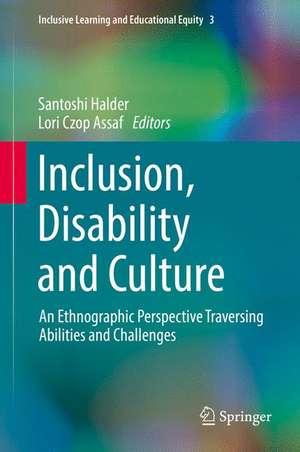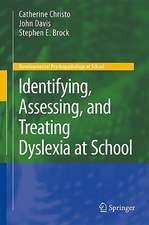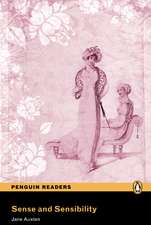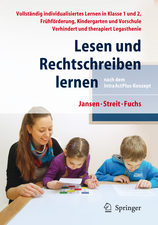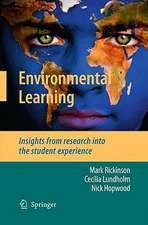Inclusion, Disability and Culture: An Ethnographic Perspective Traversing Abilities and Challenges: Inclusive Learning and Educational Equity, cartea 3
Editat de Santoshi Halder, Lori Czop Assafen Limba Engleză Hardback – 15 mai 2017
This book provides a global and social examination of how disabilities are played out and experienced around the world. It presents auto-ethnographic perspectives on disability across cultures, societies, and countries by documenting individuals’ personal narratives, thought processes and reflections.
Chapter authors share cross-cultural perspectives within and across various countries, such as India, Australia, United States, Sri Lanka, United Kingdom, Croatia, Brazil, South Africa, and Qatar. Adopting a self-reflective stance following qualitative research methodology, the chapter authors discuss the current challenges in the field. Next, they deconstruct disability identities, explore the complexities of communication with differently abled persons, examine inclusive policies, practices and interventions and present insights from caregivers. The book concludes with critical reflections and a look to the future of global diversity and inclusion.
Chapter authors share cross-cultural perspectives within and across various countries, such as India, Australia, United States, Sri Lanka, United Kingdom, Croatia, Brazil, South Africa, and Qatar. Adopting a self-reflective stance following qualitative research methodology, the chapter authors discuss the current challenges in the field. Next, they deconstruct disability identities, explore the complexities of communication with differently abled persons, examine inclusive policies, practices and interventions and present insights from caregivers. The book concludes with critical reflections and a look to the future of global diversity and inclusion.
| Toate formatele și edițiile | Preț | Express |
|---|---|---|
| Paperback (1) | 1114.34 lei 43-57 zile | |
| Springer International Publishing – 12 sep 2018 | 1114.34 lei 43-57 zile | |
| Hardback (1) | 1120.37 lei 43-57 zile | |
| Springer International Publishing – 15 mai 2017 | 1120.37 lei 43-57 zile |
Preț: 1120.37 lei
Preț vechi: 1366.30 lei
-18% Nou
Puncte Express: 1681
Preț estimativ în valută:
214.45€ • 233.02$ • 180.25£
214.45€ • 233.02$ • 180.25£
Carte tipărită la comandă
Livrare economică 21 aprilie-05 mai
Preluare comenzi: 021 569.72.76
Specificații
ISBN-13: 9783319552231
ISBN-10: 3319552236
Pagini: 390
Ilustrații: XL, 390 p. 63 illus.
Dimensiuni: 155 x 235 x 24 mm
Greutate: 0.78 kg
Ediția:1st ed. 2017
Editura: Springer International Publishing
Colecția Springer
Seria Inclusive Learning and Educational Equity
Locul publicării:Cham, Switzerland
ISBN-10: 3319552236
Pagini: 390
Ilustrații: XL, 390 p. 63 illus.
Dimensiuni: 155 x 235 x 24 mm
Greutate: 0.78 kg
Ediția:1st ed. 2017
Editura: Springer International Publishing
Colecția Springer
Seria Inclusive Learning and Educational Equity
Locul publicării:Cham, Switzerland
Cuprins
1. Disability and Inclusion: Current Challenges; Santoshi Halder, Lori Assaf and Mary Keeffe. Section 1: Deconstructing Disability Identities.- 2. Disability, Culture, and Identity in India and USA; Christopher J. Johnstone, Sandhya Limaye and Misa Kayama.- 3. Disability: A Result of Cultural Ostracism; Samidha Sikha.- 4. Perseverance Pays: From Impairment to Disability; Satendra Singh.- 5. “Not everybody can take trips like this”: A Paralympian’s Perspective on Educating about Disability Around the world; Anjali J. Forber-Pratt.- 6. When Gucci Make Hearing Aids, I’ll Be Deaf: Sensory Impairment in Later Life and a Need to Define it According to Identity; Simon Hayhoe.- 7. Looking Back Over My Shoulder: Through The Disability’s Mirror; Bernardo Carlos de Oliveira.- 8. When Stigma Resonates Inside – How A Misleading Perspective on Impairment Interferes in the Way People with Disabilities Perceive Themselves; Flavia Mayer.- 9. There Is No “Dis” In Our Abilities: Acknowledging the Experience of the Differently-Abled Community; Caroline Muster.- Section 2: Exploring the Complexities of Communication with Differently Abled Persons.- 10. Communication with Persons with Disabilities vs. Communication with Differently Abled Persons; Ivana Bilić.- 11. Empathic Communication: Bridging Differences in a Global Context; Erna Alant, Beth Lewis Samuelson and Lindsey Ogle.- 12. Severe Communication Disabilities in South Africa: Challenges and Enablers; Shakila Dada, Harsha Kathard, Kerstin Tönsing and Michal Harty.- 13. Enriched Audio Description: Working towards an inclusive museum Experience; Alison F. Eardley, Louise Fryer, Rachel Hutchinson, Matthew Cock, Peter Ride and Joselia Neves.- Section 3: Inclusive Policies, Practices and Interventions.- 14. Inclusive Practices in Mainstream Schools: An Australian Perspective; PoulomeeDatta, Christine Grima-Farrell and Mitchell Graeme Coates.- 15. Gifted and Talented Students: A Review of the Concept from Indian Experience; Partha Pratim Roy.- 16. Sociocultural Construction of Disability in Sri Lanka: Challenges towards Charity Perspective to Rights-based Approach; Chandani Liyanage.- 17. More than a Ramp: Accessibility as Interpreted by Modernist Architecture in Latin America; Norma Isa Figueroa.- 18. Individualized approach for inclusion of children with diverse behavioural needs; Santoshi Halder.- 19. Employment and Autism: Personal, Social and Economic Impact; Darren Hedley, Mirko Uljarević, and David F. E. Hedley.- 20. Legislation, case law and current issues in inclusion for the United States, Australia and India; Mary Keeffe and Rittika Ghosh.- Section 4: Insights from Caregivers.- 21. Meeting the Needs of Children with Complex Academic, Mental Health, and Health Needs: Lessons Learned from Families and Teachers; Elizabeth Anderson.- 22. Great Expectations for the Modern Day Dispossessed - An Individual’s Journey of Changes in Beliefs and Attitudes; Natalya Panteleyeva.- 23. Growing With ‘Zico’ and Autism: A Parents’ Perspective; Lily Chakraborty.- 24. Concluding Chapter: Global Diversity and Inclusion: Critical reflections and Future Directions; Santoshi Halder and Lori Assaf.
Textul de pe ultima copertă
This book provides a global and social examination of how disabilities are played out and experienced around the world. It presents auto-ethnographic perspectives on disability across cultures, societies, and countries by documenting individuals’ personal narratives, thought processes and reflections.
Chapter authors share cross-cultural perspectives within and across various countries, such as India, Australia, United States, Sri Lanka, United Kingdom, Croatia, Brazil, South Africa, and Qatar. Adopting a self-reflective stance following qualitative research methodology, the chapter authors discuss the current challenges in the field. Next, they deconstruct disability identities, explore the complexities of communication with differently abled persons, examine inclusive policies, practices and interventions and present insights from caregivers. The book concludes with critical reflections and a look to the future of global diversity and inclusion.
Caracteristici
Advances through understanding of the challenges and abilities of individuals with disabilities Represents the state of the art in research and practice of qualitative inquiry into disability Is based on mixed-method and qualitative research methodology Brings together accounts from self-advocates, educators, researchers, self-educators, experts and specialists, including parents
